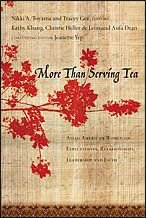Tuesday, March 4, 2008
Silencing Ourselves
I spent some time this past weekend with a great group of students and youth ministry leaders at North Park University's Center for Youth Ministry Studies Topics course on ministering to Asian American Youth. Many thanks to Dr. Jim, Ginny and Alison for being such gracious hosts!
My role was sharing stories about "Growing Up Asian American" and connecting my bicultural upbringing with my philosophy of ministry and how I've approached faith and ministry through that lens. Before writing More Than Serving Tea, I had never seriously considered how storytelling might be a significant part of my teaching voice...but that's for another day.
For this particular course it was helping connect the dots between the Asian American experience of liminality and how we as Christians also experience a similar in between-ness as ones who are in this world but are not to be of this world. It was helping young youth ministry leaders serving cross-culturally understand that they are to be students as they are teachers and leaders. It was also blessing majority culture white students and African American students and thanking them for the ways their cultures bless Asian Americans.
But in the midst of all this great dialogue and discussion were a few bittersweet moments. One such moment was when a young woman approached me and described how she had begun silencing herself in ministry contexts after she had gotten married. She and her husband serve the church together, but my sense was that it was a two-for-one deal - he is the leader, and she is his wife who also serves.
Tracey Gee writes about this in the book (p. 177). Women becoming the quiet "sidekicks" of their husbands or their male ministry partners. Somewhere along the line, and I think mistakenly so, godly submission is too often translated by ourselves and others into silence and subservience.
The session was about to start up again, so there was little time for conversation. It felt a bit trite to remind her that she was to be a steward of God's gifts of leadership and teaching, not because it's unimportant to encourage and bless one another as women but that it's not the only way to stop one another from silencing ourselves. The beauty and irony of it is that we need men to advocate for us, invite us to the table, share the power and authority. We are not supposed to be alone in silence.
It's no secret. I'd like to have more of an audience with the men of the church because there are too many women's whose gifts for the Kingdom are being overlooked, overshadowed, ignored or invalidated.
What would an honest and gracious conversation between the Asian American women and men of the church look like? And what might that do to further to conversations of about faith and Christ?
Subscribe to:
Post Comments (Atom)

No comments:
Post a Comment